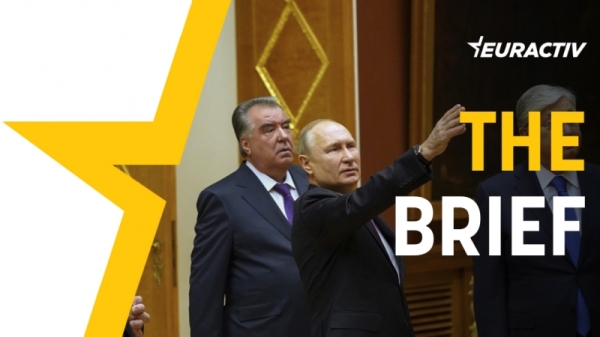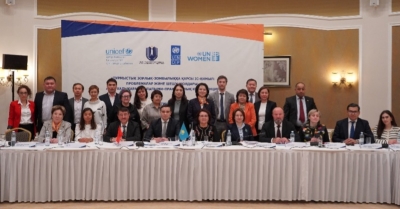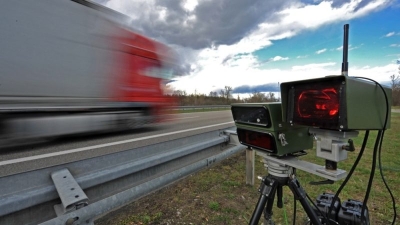The Brief — Red alert for Central Asia

The Russian aggression in Ukraine is possibly the symptom of even bigger geopolitical turmoil lurking just behind the corner.
In an interview about the role of China as a possible mediator in the Ukraine conflict, conducted with French TV channel LCI on 21 April, Lu Shaye, China’s ambassador to France, made comments that may destabilise the world order as we know it.
The Chinese ambassador said former Soviet countries had no “effective status” in international law because there was “no international agreement to concretise their statute of sovereign countries”.
He was, of course, referring primarily to Ukraine, but nevertheless, the remark questions the sovereign status of all 14 former Soviet republics.
The statement is of particular concern for the five countries of Central Asia because of their proximity to China. The alleged “absence of an international agreement to concretise their status” may be interpreted as if their sovereignty lacked the Chinese seal of approval.
China and the other permanent UN Security Council members have recognised Kazakhstan, Uzbekistan, Tajikistan, Kyrgyzstan, and Turkmenistan after they declared their independence from the former Soviet Union in 1991.
At that time, no one, not even China, had raised the need to conclude an “international agreement” by including the superpowers. Moreover, the three countries neighbouring China (Kazakhstan, Kyrgyzstan, and Tajikistan) signed border agreements with Beijing in the 1990s.
But perhaps sovereignty is not what international law says, and perhaps superpowers like Russia and China remain free to interpret the sovereignty of their neighbours as they like? Russia and Ukraine also signed a land border treaty in 2003 – and we all know what happened next.
After more than 30 years of independence, the landlocked countries of Central Asia ensured their “sovereignty” by often giving Russia and China what they wanted without waiting for them to ask.
It was Kazakhstan – under former President Nursultan Nazarbayev – who proposed (in a speech at Moscow State University in 1994) establishing the Eurasian economic union. It was alongside Nazarbayev again, in the university bearing his name in Astana 2013, that Chinese President Xi Jinping announced the Belt-and-Road initiative.
In more recent times, in the context of Russia’s aggression against Ukraine, Kazakhstan and the others gave flesh to the concept of sovereignty by refusing to recognise the territories illegally annexed by Moscow and abstaining from votes in the UN.
What they got in exchange from Russia is that Kremlin propagandists threatened to make Kazakhstan the next Ukraine. Many Russians indeed believe it is time their country annexed northern Kazakhstan.
Former Russian President Dmitry Medvedev called Kazakhstan “an artificial state” in a long post on the Russian version of Facebook, although he deleted it shortly after.
Diplomats in Astana told me that Medvedev might be dismissed as a drunk and a clown, but his prominent role is to say aloud what the Kremlin boss thinks quietly. The apparent message is: “You will be sovereign only if you do what we tell you”.
Outside of China itself, Kazakhstan is the most impacted country by what is happening in the Uyghur region today.
Kazakhstan has the largest Uyghur diaspora outside China, estimated at over 200,000, while ethnic Kazakhs are the largest group after Uyghurs to be subjected to the genocidal policies the Chinese state has implemented in the Uyghur region.
Despite latent Sinophobia in Kazakhstan, Astana has tried not to antagonise Beijing, but the risk factor still exists.
Countries in Central Asia fear that they are not on the West’s radar, and they see the West already overwhelmed by the crisis in Ukraine.
If a US official is paying attention to them these days, it is not for their own sake, it is only to ensure that Western sanctions on Russia are not circumvented via their territory.
Central Asia would undoubtedly benefit from more attention from the EU and its member states. Both sides would really be better off focusing on partners who don’t have a hidden agenda.
The Roundup
EU foreign ministers approved on Monday the launch of a new civilian mission to be deployed in Moldova to help Chișinău face foreign interference and hybrid threats.
Brazil, Chile, Nigeria, and Kazakhstan are four key “priority countries” the EU aims to keep close in its efforts to deal with Russia and contain China, according to an internal memo seen by EURACTIV.
The upcoming Spanish EU Council presidency will push to improve monitoring of national minimum income schemes, Spain’s minister for inclusion and social security José Luis Escrivá told EURACTIV, adding that the EU should move towards a minimum income directive.
EU ministers approved the pay transparency directive on Monday, establishing rules and criteria aimed at closing the gender pay gap and increasing salary transparency across member states.
Climate change and evolving trends in consumer behaviour have redirected the EU´s attention toward new ways of producing and consuming food to improve its safety, quality and sustainability. The EU’s Farm to Fork strategy aims at providing those fundamental changes through the use of innovation and technologies and by promoting new production models.
At least five EU countries want to see the amount of green jet fuel from used cooking oil (UCO) legally capped, EURACTIV has learned, a requirement that would have significant ramifications for the production of sustainable aviation fuel (SAF) in Europe.
The European Union and Norway signed a ‘Green Alliance’ on Monday, committing to work together on tackling climate change, protecting nature and developing the technologies needed to transition away from fossil fuels.
Treatment of multiple myeloma has come a long way in Poland as the state has added more therapies in its reimbursable drug programme, stakeholders have said but stressed the need for more efforts on potential bone marrow donors who provide another vital treatment option.
Look out for…
- Commission Vice President Margaritis Schinas meets with Mental Health Europe.
- Commission First Vice President Frans Timmermans receives directors from Green10, a coalition of ten largest environmental organisations and networks active at EU level.
- Trade Commissioner Valdis Dombrovskis receives President of Finnish Innovation Fund Sitra Jyrki Katainen.
- Agriculture and Fisheries Council Meeting on Tuesday.



